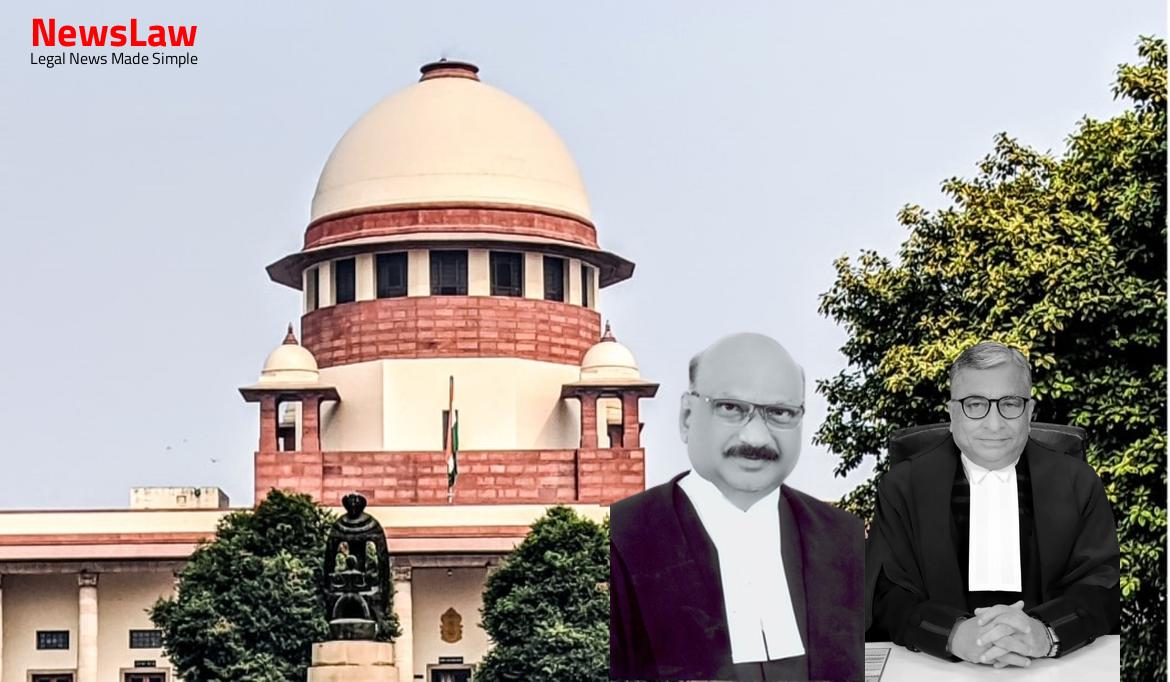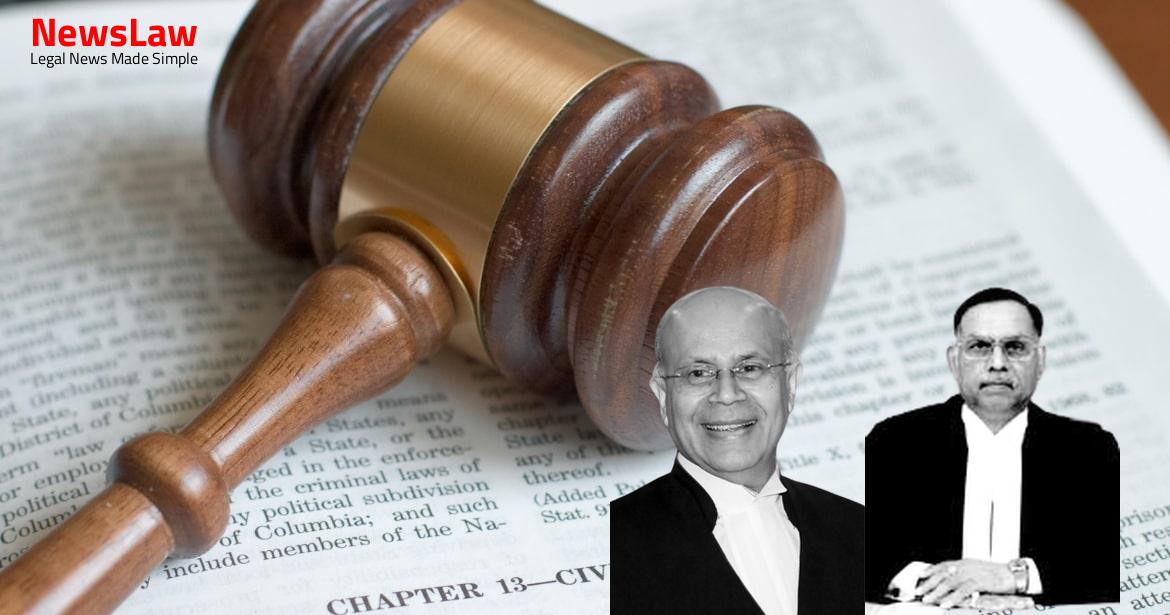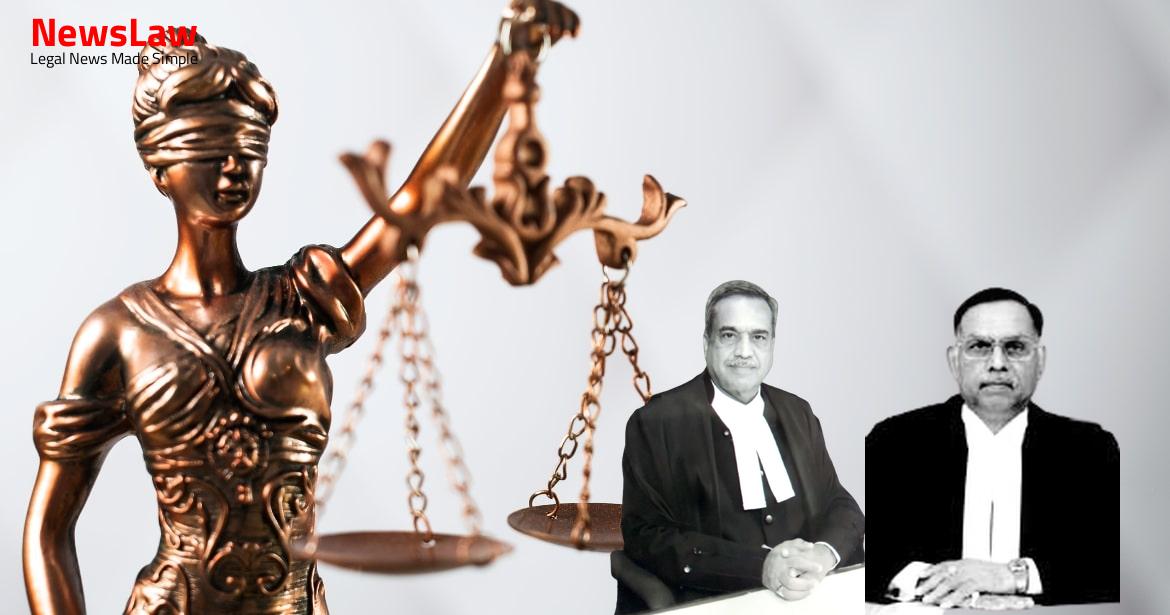In a significant legal development, the Supreme Court recently issued a ruling in the case involving the State Screening Committee and Original Name. The judgement focused on the principles of fairness and objectivity in selection processes, setting a new standard for judicial review in such matters. This decision has far-reaching implications for future cases involving similar issues. Stay informed about the latest legal updates with us!
Facts
- The Tribunal dismissed Respondent No 1’s application as no finding was made that he was the most meritorious candidate or that gross injustice had occurred due to his non-inclusion initially.
- Respondent No 1’s name occurring at Serial No 3 in the list forwarded to the State Screening Committee was justified as there was no illegality or mala fides.
- The Tribunal reasoned that even if Respondent No 1’s name had been at the top, he would still have figured at Serial No 14 in the State Screening Committee’s list, making his placement irrelevant.
- Respondent No 1’s case was dismissed as it was based on conjectures, and directing the State Screening Committee to recommend his name would amount to evaluating merit by the authorities.
- The High Court set aside the Tribunal’s order stating that the State Screening Committee failed to provide reasons for its decision and should have included Respondent No 1’s name as the first candidate in the recommendations list.
- The Court emphasized that the mere presence of senior officers on the committee does not guarantee fairness, and the post was considered vacant for the year 2014 for Respondent No 1’s consideration.
- The High Court directed the State Screening Committee to recommend Respondent No 1’s name to the UPSC and expected the UPSC to conduct his interview and evaluation within six weeks.
- The Selection Committee of the Department of Agriculture initially recommended the names of four officials, including the Appellant and Respondent No 1.
- After the minister’s direction, three names were forwarded to the State Screening Committee with Respondent No 1 at Serial No 3.
- The State Screening Committee recommended ten names to the UPSC, excluding Respondent No 1, and two officers were selected, one of whom was the Appellant.
- The entire selection process for the IAS vacancies was detailed, leading to the court intervention in reconsidering Respondent No 1’s appointment.
- The Court found the selection process lacking objectivity and fairness.
- There were apparent efforts to keep Original Name out of the process at every stage.
- The fate of the Appellant’s inclusion in the IAS cadre depended on the decision regarding Original Name’s selection.
- The High Court overturned the Tribunal’s decision and directed the State Screening Committee to recommend Original Name’s name to the UPSC for objective consideration.
Also Read: Priority of Employees’ Dues in Asset Sale: SARFAESI Act vs. Land Revenue Code
Arguments
- The learned Senior Counsel for the Appellant argued that the High Court erred in giving weight to the serial order of names before the State Screening Committee.
- Non-disclosure of reasons by a selection committee does not invalidate their decision unless required by rules, as per relevant cases.
- There was no directive from the departmental minister to prioritize the Appellant’s name.
- The direction for reconsideration of Petitioner No 1’s name alone, rather than all recommended candidates, was beyond the High Court’s jurisdiction.
- The Counsel for the State of Bihar emphasized that the selection committees undertook a fair assessment as per the 1997 Regulations without bias.
- In the absence of mala fides or bias allegations, the selection process could not be deemed to be unduly influenced.
- Petitioner No 1’s non-selection was argued to be unfair as the selection committees went beyond ACRs in recommending the Appellant.
- The addition of Petitioner No 1’s name by the Minister was valid as per the GAD letter, which mandated ministerial approval for recommendations.
- The scope of judicial review for non-SCS officers’ selection to IAS was discussed, highlighting the limited scope for re-assessment of individual candidates’ merit.
- Reference was made to the decision in Union Public Service Commission v. M. Sathiya Priya, emphasizing that High Court could not reassess committee findings on merit.
Also Read: Judgment Acquitting Accused in Satpal v. State of India
Analysis
- The Departmental Selection Committee recommended the names of the Appellant and Original Name for selection to the IAS.
- The High Court and Tribunal should not address questions of comparative merit of candidates in these cases.
- The Selection Committee must consist of experts in the field and prioritize integrity of candidates based on their confidential reports.
- The order of placement of candidates’ names in the lists prepared by the departmental and State committees was wrongly weighed by the High Court.
- Criteria for valid recommendation include excellent qualifications and the absence of any prima facie case against the recommended officers.
- The State Screening Committee correctly considered only the two names recommended by the departmental Selection Committee.
- The function of the Selection Committee is not judicial or adjudicatory in nature.
- The primary reason for Original Name’s name not being recommended in 2014 was because it had been recommended earlier.
- Fairness and fair procedure must be observed in administrative actions.
- Administrative decisions should be made reasonably without being influenced by irrelevant considerations.
- Recording reasons for selection or non-selection is not required by the principles of natural justice unless there is a statutory requirement.
- The giving of reasons for a decision is different from the requirements of procedural fairness.
- The decision in National Institute of Mental Health has been affirmed in subsequent cases, including Union Public Service Commission v. Arun Kumar Sharma.
- High Court should not sit in judgment over the merit of the candidates or substitute its reasoning for that of the Screening Committee.
- No hint of arbitrariness, mala fide, or bias in the recommendation of two officers, including the Appellant, by the Department of Agriculture in 2014.
- The High Court erred in concluding that the non-recommendation of the Original Name was suspect due to his earlier recommendation being in limbo.
- The direction by the High Court to recommend the Original Name to the UPSC was without jurisdiction.
- If arbitrariness is found in the selection process, the Court could direct the Screening Committee to reassess all candidates while considering relevant documents.
- There is no need to direct the reconsideration of the seventeen candidates before the Screening Committee or interfere with the appointments made for the Selection Year 2014.
Also Read: Landmark Supreme Court Judgment in Parasvanath Developers Ltd. v. Chandigarh Housing Board
Decision
- The decision of the High Court has been set aside.
- The instant appeals have been allowed.
Case Title: BAIDYANATH YADAV Vs. ADITYA NARAYAN ROY
Case Number: C.A. No.-008847-008847 / 2019



